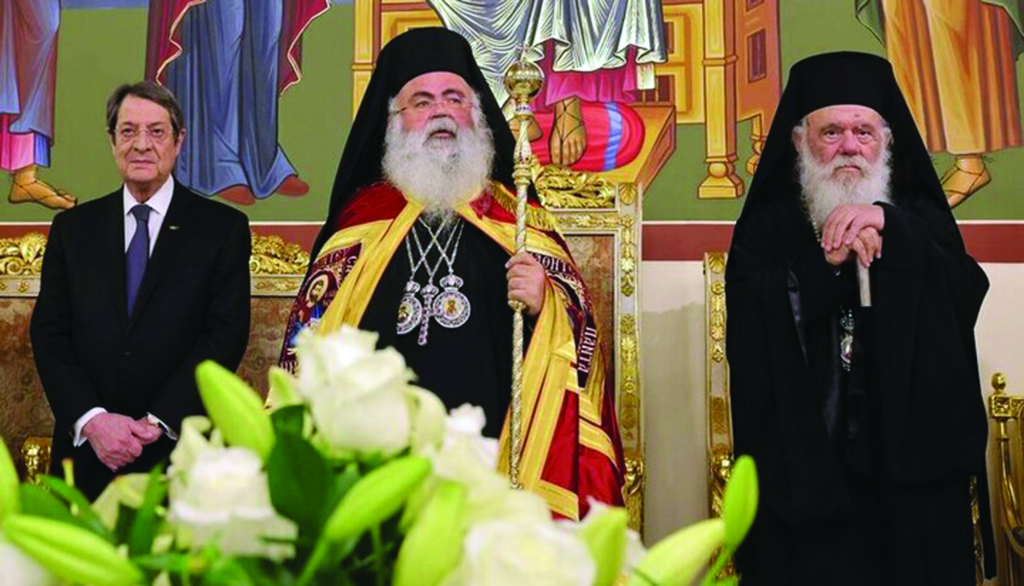By Peter Anderson

The enthronement ceremony of the new Archbishop of Cyprus, Georgios, took place at the Cathedral of the Apostle Barnabas in Nicosia
On November 7, 2022, the primate of the Orthodox Church of Cyprus, Archbishop Chrysostomos II, died at the age of 81. Because of this, it was necessary to choose a successor. The Church of Cyprus is one of the autocephalous churches of the Orthodox world, and this means that it elects its own primate. For Catholics, it has been established for almost a millennium that cardinals elect the new Pope. However, among the various autocephalous Orthodox churches, the procedures for electing a new primate vary widely. For some Orthodox churches, the laity is involved to some degree in the election, and for others, only bishops are involved. A specific autocephalous church may also change its procedure from time to time.
In 2010 the Church of Cyprus adopted a unique procedure for electing a new primate. The procedure involves two stages. First, there is a general election in which all of the Cypriot Orthodox faithful (age 18 or older) are eligible to cast a ballot designating their favorite candidate for primate. The three candidates who receive the most votes then advance to the second stage. In the second stage, the Holy Synod (consisting of all of the 16 Cypriot bishops) selects a new primate from one of those three candidates.
Applying this new procedure, the general election was held on December 18, 2022. The voters chose between six bishops who had declared their candidacy for the office of primate. There were 548,793 eligible voters, but only 165,688 (30.2%) voted. The three bishops who received the greatest percentage of the votes were: Metropolitan Athanasios of Limassol — 35.68%; Metropolitan Georgios of Paphos — 18.39%; and Metropolitan Isaias of Tamasos —18.10%. After this first round, there was general agreement among experts and the media that the second and final stage would be a contest between Athanasios and Georgios.
These two are poles apart on certain issues.
Metropolitan Athanasios, born in Limassol, Cyprus in 1959, is very much a product of Mt. Athos. He became a monk at Mt. Athos in 1980 and only two years later was granted the “Great Schema” (the highest level of asceticism allowed to those with great spirituality). Beginning in 1991, he served a one-year term as head of the body that governs the entire Mt. Athos complex. He returned to Cyprus and in 1999 became the Metropolitan of Limassol, the second largest city in Cyprus, at the very early age of 39. He is a prolific writer who is popular particularly among the most conservative Orthodox.
Metropolitan Georgios, born in a Cypriot village, studied both theology and chemistry in Athens and in England. In 1994 he became secretary of the Holy Synod and was ordained a bishop in 1996. In 2006, Georgios became the new Metropolitan of Paphos, an important port city visited by the apostle St. Paul. Since 2006, Georgios has represented the Church in various pan-Orthodox and ecumenical meetings.
On December 24, 2022, the Holy Synod met and selected Metropolitan Georgios as the Church’s new primate. This choice is good news for the Ecumenical Patriarchate and bad news for the Moscow Patriarchate. Georgios had supported the decision of Archbishop Chrysostomos II in 2020 to recognize the new Orthodox Church of Ukraine, while Athanasios had strongly opposed this decision.
The selection of Georgios is also good news for Catholics. Georgios is very ecumenical and has participated for years in the international Catholic-Orthodox theological dialogue. On the other hand, Athanasios boycotted the visits to Cyprus by Pope Benedict and Pope Francis, whom he considers to be heretics and not even bishops.






Facebook Comments